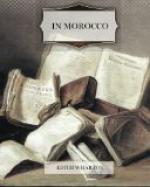Conversation with the shy Princess was flagging when one of the favourites beckoned us to the balcony. We were told we might push open the painted panes a few inches, but as we did so the butterfly group drew back lest they should be seen looking out on the forbidden world.
Salutes were crashing out again from the direction of the msalla: puffs of smoke floated over the slopes like thistle-down. Farther off, a pall of red vapour veiled the gallop of the last horsemen wheeling away toward Rabat. The vapour subsided, and moving out of it we discerned a slow procession. First rode a detachment of the Black Guard, mounted on black horses, and, comically fierce in their British scarlet and Meccan green, a uniform invented at the beginning of the nineteenth century by a retired English army officer. After the Guard came the standard-bearers and the great dignitaries, then the Sultan, still aloof, immovable, as if rapt in the contemplation of his mystic office. More court officials followed, then the bright-gowned musicians on foot, then a confused irrepressible crowd of pilgrims, beggars, saints, mountebanks, and the other small folk of the Bazaar, ending in a line of boys jamming their naked heels into the ribs of world-weary donkeys.
The Sultan rode into the court below us, and Vizier and chamberlains, snowy-white against the scarlet line of the Guards, hurried forward to kiss his draperies, his shoes, his stirrup. Descending from his velvet saddle, still entranced, he paced across the tiles between a double line of white servitors bowing to the ground. White pigeons circled over him like petals loosed from a great orchard, and he disappeared with his retinue under the shadowy arcade of the audience chamber at the back of the court.
[Illustration: From a photograph from “France-Maroc"
The Sultan entering Marrakech in state]
At this point one of the favourites called us in from the mirador. The door had just opened to admit an elderly woman preceded by a respectful group of girls. From the newcomer’s round ruddy face, her short round body, the round hands emerging from her round wrists, an inexplicable majesty emanated; and though she too was less richly arrayed than the favourites she carried her headdress of striped gauze like a crown.
This impressive old lady was the Sultan’s mother. As she held out her plump wrinkled hand to Mme. Lyautey and spoke a few words through the interpretess one felt that at last a painted window of the mirador had been broken, and a thought let into the vacuum of the harem. What thought, it would have taken deep insight into the processes of the Arab mind to discover; but its honesty was manifest in the old Empress’s voice and smile. Here at last was a woman beyond the trivial dissimulations, the childish cunning, the idle cruelties of the harem. It was not a surprise to be told that she was her son’s most trusted adviser, and the chief authority in the palace. If such a woman deceived and intrigued it would be for great purposes and for ends she believed in; the depth of her soul had air and daylight in it, and she would never willingly shut them out.




